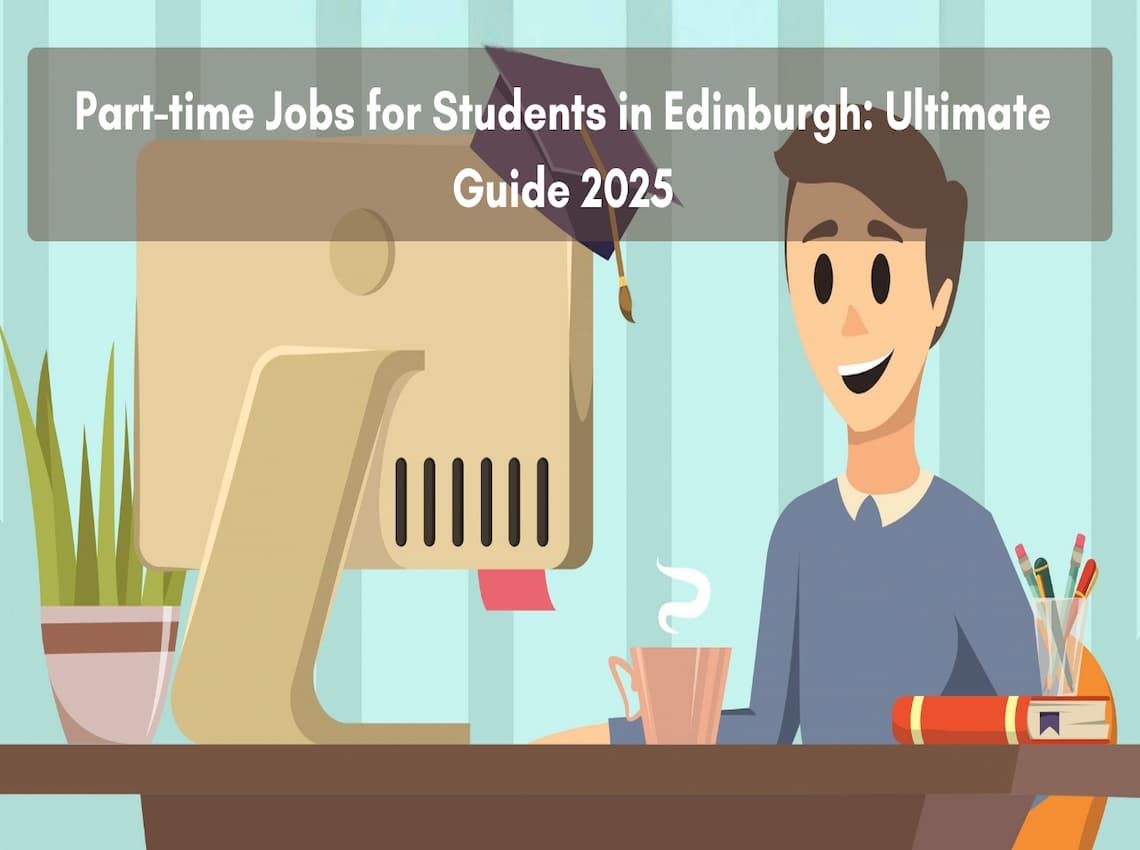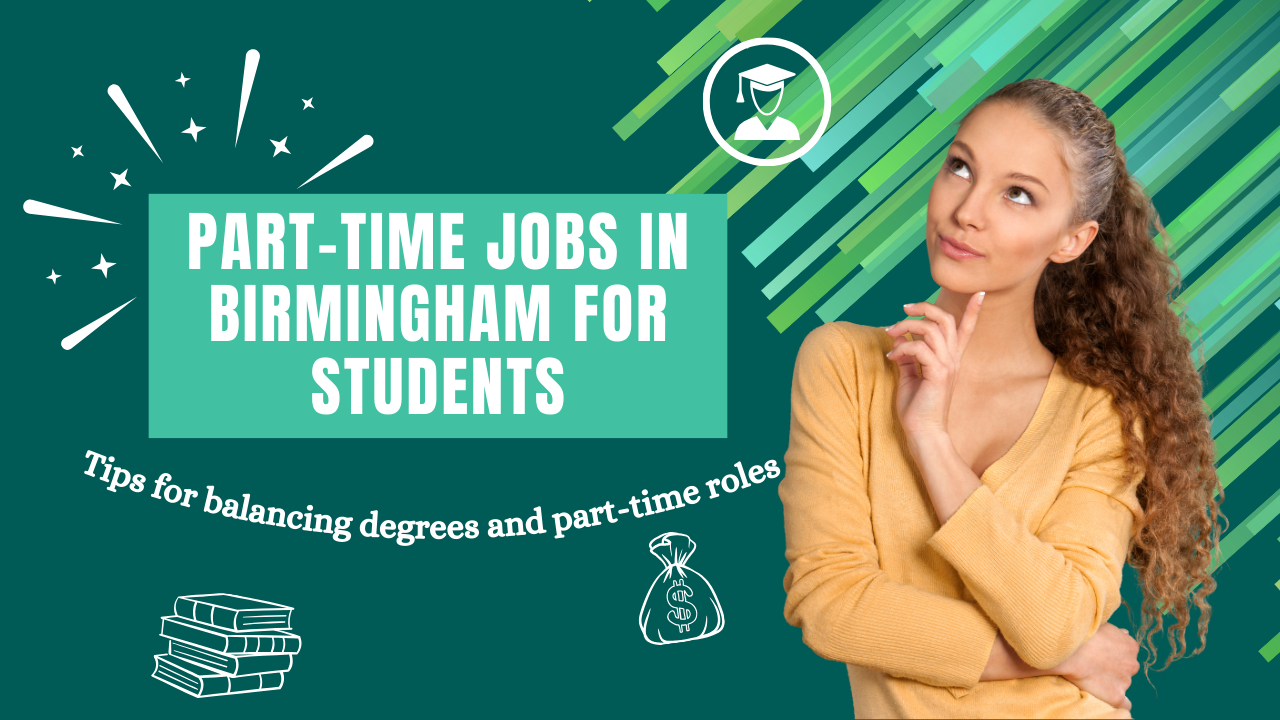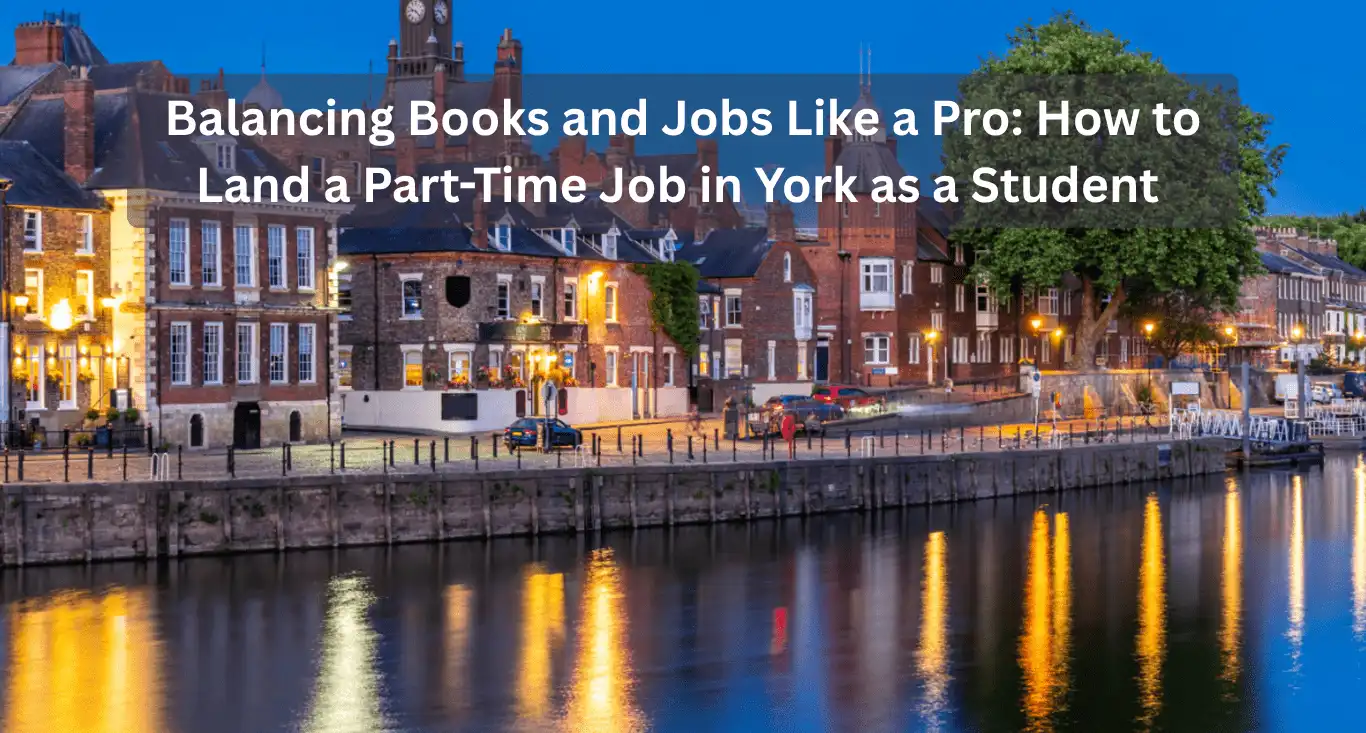

Part-time Jobs for Students in Edinburgh: Ultimate Guide 2025
I've watched loads of international students navigate Edinburgh's job market over the years. Some nail it immediately, others struggle for months. The difference? Knowing where to look and what employers actually want.
This guide covers everything you need to know. From visa rules (crucial if you're international) to finding accommodation that puts you close to the best jobs. And yes, we’ll also cover student accommodation in Edinburgh so you can live smart and work smart.
If you’re just starting out, begin with our complete Edinburgh student guide.
TL;DR
Part-Time Work for Students in Edinburgh
- Work Hour Limit:
International students can work up to 20 hours per week during term time.
- Average Pay Rates:
- Hospitality: £8.21 – £11/hour
- Retail: £8.21 – £10/hour
- Tutoring: £12 – £20/hour (highest paying)
- University Jobs: £8.21 – £12/hour
- Where to Look:
- Start with MyCareerHub (the university job portal)
- Walk around Princes Street and the Royal Mile for local openings.
- Accommodation Tip:
- Central areas are best for hospitality jobs
- Near-campus locations work well for university roles
Why Edinburgh Actually Works for Student Jobs
Edinburgh's economy runs on sectors that love hiring students. It's not just luck - there are real reasons this city works.
Tourism never stops here. Summer festivals bring mental crowds. Winter sees Christmas shoppers and Hogmanay visitors. Spring and autumn have a steady tourist flow. You'll always find hospitality work.
Multiple universities mean tutoring opportunities everywhere. With the University of Edinburgh, Edinburgh Napier University, Heriot-Watt University, and Queen Margaret University all based in the city, there's constant demand for academic support.
The city centre's tiny. You can walk from most student areas to job hotspots in 20 minutes. That matters when you're balancing lectures and shifts.
Employers get students here. They know about exam periods, assignment deadlines, and semester breaks. Most are pretty flexible if you communicate properly.
Job opportunities are just one part; read why life in Edinburgh is uniquely exciting for students.
Read Also:
Why Live in Edinburgh: Ultimate Student Guide
Legal Stuff You Actually Need to Know
If You're from the UK or EU
Get your National Insurance number immediately. Not next week, not when you find a job, now. The process takes 2-4 weeks, and you can't work without it.
Tax thresholds for 2025:
- Income tax kicks in at £12,570 yearly (most students don't hit this)
- National Insurance starts at £242 weekly (about 12% of what you earn over this)
- Student loan repayments begin at £27,295 yearly (unlikely while studying part-time)
If You're International
Your visa is everything. Seriously, don't mess around here. Most student visas allow 20 hours weekly during term time. Unlimited hours during official holidays (Christmas, Easter, summer break).
You cannot be self-employed. No running a business, no freelance work that counts as self-employment. Stick to employed positions.
What you need before starting:
- Student visa with clear work entitlement
- UK bank account (pain to set up, but essential)
- National Insurance number
- University enrollment letter
The University of Edinburgh's Student Immigration Service is free and incredibly helpful. Use them if you're unsure about anything.
Safety is a common concern; here’s everything you need to know about Edinburgh’s safety for international students.
Student Halls Recommendation near the University of Edinburgh:
- The Mont, Edinburgh
- iQ Elliott House, Edinburgh
- iQ Grove, Edinburgh
- Arran House, Edinburgh
- Student Castle, Edinburgh
What Jobs Are Actually Available
Hospitality Work (Most Common)
Edinburgh's bar and restaurant scene is massive. Tourist demand plus the local student population means constant hiring.
What you'll actually earn:
- Bar work: £8.21-£11/hour plus tips (expect £15-40 extra per shift)
- Waiting tables: £8.21-£10/hour plus tips (can be £20-60 extra on busy nights)
- Kitchen helping: £8.21-£9.50/hour (no tips but often less stressful)
- Coffee shops: £8.21-£9.50/hour (morning people preferred)
- Hotel reception: £9-£12/hour (good for professional experience)
Where to actually look:
- Grassmarket: Traditional pubs, decent tips, can get rowdy at weekends
- Royal Mile: Tourist restaurants, better money but higher expectations
- Leith: Trendy spots, growing scene, good atmosphere
- Around universities: Student-friendly places that understand your schedule
Retail Jobs (Steady and Reliable)
Job Type | What You'll Earn | When It's Busiest | What You'll Learn |
Shop assistant | £8.21-£10/hour | Weekends, Christmas | Customer service, patience |
Stock room work | £8.21-£9.50/hour | Early mornings | Organisation, physical fitness |
Till work | £8.21-£9/hour | All hours really | Money handling, staying calm |
Customer service | £9-£11/hour | Complaint times | Problem-solving, thick skin |
Places that actually hire students regularly:
- Primark: Always needs people, very flexible with uni schedules
- Urban Outfitters: Good if you're into fashion, decent staff discounts
- John Lewis: A Bit more upmarket, looks good on your CV
- Independent shops: Often more personal, but fewer hours available
Tutoring (Best Money If You're Good)
This is where you can actually make decent money. But you need to be genuinely good at your subject.
What subjects pay well:
- GCSE/A-level maths and sciences: £12-£18/hour
- University-level support: £15-£20/hour
- English help for international students: £10-£15/hour
- Online tutoring: £10-£16/hour (work in your pyjamas)
Subjects everyone wants help with:
- Mathematics (parents panic about this constantly)
- Sciences - especially physics and chemistry
- English (massive demand from international students)
- Computer science basics
- Modern languages, if you're fluent
Getting started takes time. You'll need to build a reputation through student groups and tutoring websites.
University Jobs (They Get It)
Campus jobs understand student life better than anywhere else. They know about exam periods and assignment deadlines.
What's actually available:
- Student ambassadors: £9-£12/hour (showing prospective students around)
- Library work: £8.21-£10/hour (quiet, can sometimes study)
- Research help: £10-£15/hour (great for your field)
- Admin support: £8.21-£11/hour (proper office experience)
- Lab assistance: £9-£13/hour (if you're doing sciences)
Applications usually open at the start of each semester through university job portals.
Seasonal Work (When Everyone's Hiring)
Edinburgh Festival time (August): This is mentally busy. You can work loads of hours if your visa allows.
- Venue staff: £10-£14/hour
- Ticket sales: £9-£12/hour
- Promotional work: £8-£11/hour
Christmas retail madness (November-January): Every shop needs extra help for Christmas.
- Temporary shop work: £8.21-£10/hour
- Gift wrapping: £8-£12/hour
- Warehouse helping: £9-£11/hour
Gig economy stuff:
- Food delivery: £8-£12/hour (tips can be decent)
- Writing if you're good: £15-£30/hour (need a portfolio though)
- Pet sitting: £10-£18/hour (surprisingly popular in Edinburgh)
- Event photography: £12-£25/hour (need proper camera skills)
Where to Actually Find These Jobs
Start with University Resources
MyCareerHub (Edinburgh Uni) is brilliant. They post hundreds of student-suitable jobs and update them daily. Everything's been checked to make sure it works with student schedules.
Other uni job boards:
- Edinburgh Napier uses myFuture
- Heriot-Watt has its own student job board
- Queen Margaret has career services
Online Job Hunting
Student-specific websites:
- StudentJob.co.uk filters everything for student availability
- E4S.co.uk focuses on employment for students
- Unitemps handles university temporary work
General job sites:
- Indeed.co.uk (filter by part-time and student-friendly)
- LinkedIn is for more professional stuff
- Totaljobs.co.uk for local Edinburgh positions
Walking Around and Asking (Old School but Works)
Best areas to actually visit:
- Princes Street: All the big retailers are here
- Royal Mile: Tourist businesses always need reliable staff
- Grassmarket: Evening hospitality venues
- Morningside: Local shops and cafes (quieter but steady)
- Leith: Independent businesses, a growing area
When to go: Weekday mornings around 10-11 am work best. Managers are usually in but not dealing with customers. Avoid lunch rush times - you'll just annoy people.
How to Actually Get Hired
Your CV Needs to Be Simple
Forget fancy formatting. Employers want to see the basics quickly.
What actually matters:
- Contact details that work (UK phone number, proper email address)
- Your university, course, and when you graduate
- Any work experience at all (even weekend jobs back home count)
- Languages you speak (huge advantage in Edinburgh)
- Specific availability (not just "flexible" - give actual days and times)
What's completely pointless:
- Long personal statements nobody reads
- Work experience from five years ago
- Complicated layouts that look awful when printed
- Generic statements about being a "team player"
Interview Reality Check
Most student job interviews aren't terrifying. Managers mainly want to check you're normal and won't disappear after two weeks.
They'll definitely ask:
- "Why do you want this job?" (Don't just say money, even though it's true)
- "How will you handle work with your studies?" (Show you've thought about it)
- "What's your availability during exams?" (Be honest, upfront)
- "Tell me about dealing with a difficult situation" (Have something ready)
You should ask:
- "What training do you provide?" (Shows you're thinking long-term)
- "How flexible are shifts during exam periods?" (Crucial for students)
- "What are your busiest times?" (Shows you're prepared)
- "When would you need me to start?" (Shows enthusiasm)
Money Talk - What You'll Actually Earn
Realistic Hourly Rates (2025)
Job Type | Starting Out | After Some Experience | Premium Places |
Hospitality | £8.21-£9 | £9.50-£11 | £10-£12 |
Retail | £8.21-£8.60 | £9-£10 | £9.50-£11 |
Tutoring | £12-£15 | £16-£20 | £18-£25 |
Uni jobs | £8.21-£9 | £10-£12 | £11-£15 |
Gig work | £8-£10 | £10-£14 | £12-£18 |
What You Can Actually Earn Weekly
10 hours at £9/hour: £90 weekly, about £360 monthly 15 hours at £10/hour: £150 weekly, £600 monthly 20 hours at £11/hour: £220 weekly, £880 monthly (only during holidays for international students)
Budget Reality Check
Monthly costs in Edinburgh:
- Accommodation: £400-£800 (massive range depending on location and quality)
- Food: £200-£350 (if you cook vs eating out constantly)
- Getting around: £50-£80 (student discounts help)
- Having a life: £100-£200 (Student budget? Try the best restaurants in Edinburgh)
Work income should top up your main funding, not replace it entirely.
While you live in Edinburgh, align your budget well with your spending. Take a look at the Cost of Living in Edinburgh as a Student and manage your expenses. Also, keep track of your spending by using our cost of living calculator.
Read Also:
Looking for student accommodation?
Our support team can assist you for free Book with BestStudentHalls today!
Balancing Work with Actually Studying
Time Management That Works
Sort your academic stuff first: Block out all lectures and seminars before looking at work schedules. Reserve the two weeks before major deadlines for minimal work. Plan lighter shifts during exam periods.
Tell employers your academic calendar early. Most Edinburgh businesses get this if you're upfront.
Work patterns that make sense:
- Weekends (when businesses are busiest anyway)
- Evenings after lectures finish
- Holiday periods for intensive earning
Talking to Your Boss
Be honest about:
- Exact exam dates and revision periods
- Major assignment deadlines
- When semesters start and end
- Any trips home you've planned
Edinburgh employers deal with students constantly. They appreciate honesty over last-minute surprises.
Where You Live Matters for Jobs
Location Strategy
Your accommodation choice affects both job opportunities and how much you spend getting to work.
Central Edinburgh (Old Town/New Town):
- Good: Walk to most hospitality and retail jobs
- Bad: Higher rent costs
- Best for: Students prioritising convenience over savings
Prefer comfort and location? Explore the best in luxury student accommodation in Edinburgh.
Marchmont/Bruntsfield:
- Good: Decent transport, reasonable rent, loads of students
- Bad: 15-20 minute commute to city centre jobs
- Best for: Balance between cost and accessibility
Leith:
- Good: Growing job market locally, cheaper rent, trendy area
- Bad: Further from the university, limited late transport
- Best for: Students working in Leith's restaurant scene
Looking to save while staying connected? Here are your best bets for affordable student housing in Edinburgh.
Near Pollock Halls:
- Good: Close to university jobs, strong student community
- Bad: Limited commercial opportunities nearby
- Best for: Students focusing on campus employment
This area is perfect for those wanting to stay close to classes. Here’s a list of accommodation near the University of Edinburgh.
Not sure where to settle? Explore our guide to the best student areas in Edinburgh.
Transport Costs Matter
Daily travel options:
- Walking: Free, but limits your range
- Cycling: £1-3 daily (bike maintenance costs)
- Bus: £4.40 day ticket, £56 monthly pass
- Student discounts are available for longer passes
Do the maths: A £9/hour job that costs £6 daily in transport only gives you £6/hour effectively. An £8.50/hour job you can walk to gives you the full £8.50.
Getting around doesn’t have to cost much; our student transport guide for Edinburgh lays it all out.
Industry Tips That Actually Help
Hospitality Success
Skills worth developing:
- Learn basic cocktail recipes (makes you more valuable)
- Understand Scottish food culture (tourists ask constantly)
- Develop patience for difficult customers (they exist everywhere)
- Practice multitasking during busy periods
When will you earn the most?
- Festival season in August (mentally busy but great money)
- Rugby match days (higher tips, busier shifts)
- Christmas and New Year (premium pay rates)
Retail Excellence
Focus on:
- Learning product knowledge quickly
- Understanding return policies properly
- Building patience for challenging customers
- Creating rapport with regular customers
Many retailers offer supervisor training to reliable student workers. That means better references and higher pay.
Tutoring Success
Building your client base:
- Start with university Facebook groups
- Register with local tutoring agencies
- Contact schools during busy exam periods
- Build an online presence through tutoring platforms
Pricing strategy:
- Start competitively to get reviews
- Increase rates as you build testimonials
- Offer package deals for regular students
- Specialise in high-demand subjects
Problems You'll Face (And How to Fix Them)
"I Can't Find Any Jobs"
This usually means you're applying too late or looking in the wrong places.
Try this:
- Apply during peak hiring (September, January)
- Consider unpopular shifts (early mornings, late evenings)
- Look beyond popular areas
- Use your student network properly
"Work's Affecting My Grades"
Time to be honest about priorities.
Emergency fixes:
- Cut hours immediately during the term
- Switch to more flexible gig work
- Have proper conversations with employers
- Remember why you're actually here (studying)
"My Visa Situation is Confusing"
Keep yourself safe:
- Track your hours meticulously
- Understand what counts as holidays
- Stay in touch with the university immigration services
- Keep employment records for visa renewals
Money Management Basics
Understanding Your Payslip
What you'll see:
- Gross pay: What you earned before deductions
- Income tax: Usually zero for student workers
- National Insurance: 12% on earnings over £242 weekly
- Net pay: What actually goes in your account
Tax Refunds (Free Money)
Students often overpay tax, especially with multiple jobs or holiday work. Keep all payslips and P60 forms.
When to claim:
- End of tax year (April)
- When leaving a job
- If working multiple jobs at once
Building Skills for Later
What You Actually Learn
Customer service roles: Communication, problem-solving, and patience under pressure. Retail positions: Sales techniques, inventory management, and working in teams. Tutoring work: Teaching skills, subject expertise, and patience.
University jobs: Professional communication, admin skills
Networking That Matters
Build connections with:
- Managers and colleagues (future references)
- Other international students (shared experiences)
- Industry groups on social media
- Student networking events
Post-Graduation Opportunities
Many Edinburgh employers offer graduate schemes to reliable student workers:
- Retail management training programs
- Hospitality management opportunities
- Local business development roles
- Education sector positions
Getting Help When You Need It
University Support
University of Edinburgh:
- Student Immigration Service (visa questions)
- Careers Service (CV help, interview prep)
- Student Financial Support (emergency money help)
Edinburgh Napier:
- Student Money Advice Service
- Career Development Centre
External Support
- Citizens Advice Edinburgh: Employment rights, tax guidance
- ACAS: Workplace problems and disputes
- HMRC: Tax questions and support
Useful Apps
Job hunting:
- Indeed app with location alerts
- LinkedIn for professional opportunities
- University career portals
- Student Facebook groups
Money management:
- Banking apps for budget tracking
- HMRC app for tax information
- Receipt apps for work expenses
Looking Beyond University
Making Experience Count
Build your professional profile:
- Quantify what you achieved (sales targets, customer ratings)
- Collect references from multiple employers
- Document training and skills development
- Highlight any leadership roles
For graduate applications, Edinburgh work experience shows cultural integration, communication skills, and a work ethic to future employers.
For entrepreneurs: Student work gives insights into local markets, customer behaviour, and business operations.
There’s more to Edinburgh than part-time jobs, from Arthur’s Seat to quirky cafés, explore things to do in Edinburgh as a student.
Final Thoughts
Part-time work in Edinburgh offers way more than just money. You'll integrate into the city properly, develop professional skills, and build connections that last beyond university.
Success comes down to understanding the legal requirements, choosing roles that fit your schedule, and balancing work with academic priorities. Edinburgh's diverse economy and student-friendly culture create genuine opportunities for motivated students.
Start your job search early. Be realistic about your availability. Choose positions that enhance rather than compete with your studies. The right part-time job will make your Edinburgh experience richer while building skills for your future career.
Ready to find accommodation that puts you perfectly positioned for Edinburgh's job market? Visit Best Student Halls to explore premium student housing near the city's best employment opportunities.
Frequently Asked Questions
What is the best part-time job for students in the UK?
The best part-time job really depends on your skills and schedule. Many students go for hospitality or retail, but tutoring and uni campus jobs pay better and offer flexibility, plus, they actually look great on your CV.
Is it easy to get a job in Edinburgh as a student?
It’s definitely possible, especially if you start early in the term. Edinburgh’s packed with cafes, shops, festivals, and student-friendly employers. Just be proactive, CVs in hand, use uni job boards, and don’t be shy to ask around.
How much can a student earn in Edinburgh?
Most part-time student jobs in Edinburgh pay between £8.50 and £12 an hour. Tutoring or uni roles can go higher. If you work 10–15 hours a week, you could earn around £350–£600 a month, which is pretty handy support!

Akash
Akash is a skilled content writer and social media expert with over three years of experience. With a background in Mechanical Engineering, he often creates succinct and insightful blogs for the student accommodation sector. Akash is committed to creating interactive content that appeals to all students. His hobbies include design, creating films and solo travel. He is also an active patron of the theatre and performing arts.

Part-Time Jobs in Birmingham for Students: Your Complete Guide to Finding Work in 2025

How to Balance Part-time Jobs and Studies: Tips for UK Students

How to Land a Part-Time Job in York as a Student: Balancing Books & Jobs Like a Pro


 Free Cancellation
Free Cancellation














Comments
Leave a comment